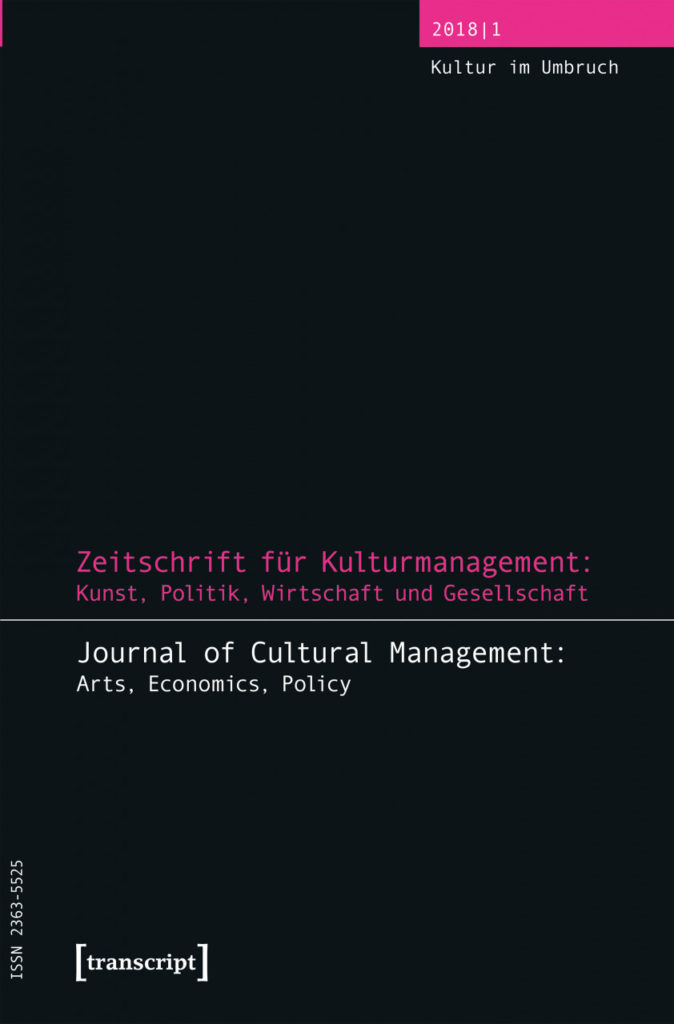Introduction
Kultur im Umbruch
Kulturproduktion und Kulturkonsumption unterliegen aktuell einem fundamentalen Wandel, für den sozioökonomische, demographische und technologische Entwicklungen gleichermaßen verantwortlich sind. Prozesse der Migration, Digitalisierung und Globalisierung gehen mit einer Neuordnung des kulturellen Feldes einher. Praktiken, Institutionen und Arbeitsbedingungen in der Kultur verändern sich fundamental. Betroffen von diesem Wandel sind kulturell-künstlerische Produktion, Distribution und Rezeption (z. B. TTIP, Kulturschutzgesetz, neue Technologien etc.). Vor diesem Hintergrund zeichnet sich eine sektorale Neuverortung und Neubestimmung ab, …
Read MoreEditorial
Journal of Cultural Management 2018 (1)
http://dx.doi.org/10.14361/zkmm-2018-0101
Research Article
Journal of Cultural Management 2018 (1)
http://dx.doi.org/10.14361/zkmm-2018-0102
Research Article
Journal of Cultural Management 2018 (1)
http://dx.doi.org/10.14361/zkmm-2018-0103
-
Journal of Cultural Management 2018 (1)
http://dx.doi.org/10.14361/zkmm-2018-0104
-
Journal of Cultural Management 2018 (1)
http://dx.doi.org/10.14361/zkmm-2018-0105
-
Journal of Cultural Management 2018 (1)
http://dx.doi.org/10.14361/zkmm-2018-0106
Research Article
Journal of Cultural Management 2018 (1)
http://dx.doi.org/10.14361/zkmm-2018-0107
-
Abstract
The aim of the presented study was to do a pilot research on the comparison of the incidence of stress in a group of students of music management and art of music. We examined whether artists and music managers differ in the perception of the intensity of stress when playing (working) solo from the intensity when playing (working) in group. Furthermore, we focused on the most common stressors and main stress symptoms among music managers and artists. Total 63 students of music, cultural or art management (average age 28.6 years; 69.8 % were women) and 75 students of art of music (average age 26.7 years; 64 % were women) filled out an online questionnaire in the spring of 2016. The results show that while artists reported higher stress levels when playing solo, music managers reported higher stress levels when working in a group. A closer look showed that while only a few music managers (4,8 %) are intensely stressed when working in a team, a considerable group of artists (26 %) stated that they were most stressed out when playing solo. As their main work stressors artists mentioned blackouts, unpreparedness, and audience, music managers listed flaws in the human factor, time pressure and financial problems. Stress symptoms among artists are mainly physiological and short-term but at the same time intensive, while stress symptoms among music managers are rather long-term and related to psyche, and relationships with others.
Journal of Cultural Management 2018 (1)
http://dx.doi.org/10.14361/zkmm-2018-0108
-
Journal of Cultural Management 2018 (1)
http://dx.doi.org/10.14361/zkmm-2018-0109
Conference Review
Journal of Cultural Management 2018 (1)
http://dx.doi.org/10.14361/zkmm-2018-0110
-
Journal of Cultural Management 2018 (1)
http://dx.doi.org/10.14361/zkmm-2018-0111
Book Review
Journal of Cultural Management 2018 (1)
http://dx.doi.org/10.14361/zkmm-2018-0112
Christiane SCHÜRKMANN (2017): Kunst in Arbeit. Künstlerisches Arbeiten zwischen Praxis und Phänomen.
Book Review
Journal of Cultural Management 2018 (1)
http://dx.doi.org/10.14361/zkmm-2018-0113
-
Journal of Cultural Management 2018 (1)
http://dx.doi.org/10.14361/zkmm-2018-0114
Book Review
Journal of Cultural Management 2018 (1)
http://dx.doi.org/10.14361/zkmm-2018-0115
© 2024, Journal of Cultural Management and Cultural Policy
Keywords
- aesthetics
- higher education
- cultural diplomacy
- career, professional role
- audience studies
- Business
- digitalization, digitization
- diversity
- empirical aesthetics
- entrepreneurship
- development, transformation
- ethics
- Evaluation
- festival
- film
- social change
- ideology
- staging
- communication
- Concert
- creativity
- culture
- arts organizations, cultural organizations
- fincancing the arts
- cultural history
- cultural economy
- art education
- cultural policy
- cultural sociology
- audience development, art education
- arts administration, arts management
- cultural industry
- cultural sciences
- art
- arts research
- curating
- artists
- leadership
- management
- marketing
- market
- media
- methods development
- museum
- music
- opera
- orchestra
- organization
- law
- social cohesion
- community arts
- state
- urbanism
- dance
- theater
- theory development
- tourism
- civil society, third sector



